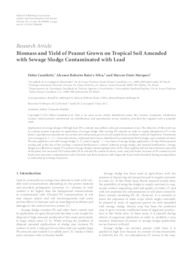Biomass and yield of peanut grown on tropical soil amended with sewage sludge contaminated with lead.
Biomass and yield of peanut grown on tropical soil amended with sewage sludge contaminated with lead.
Author(s): CAMILOTTI, F.; SILVA, A. R. B. e; MARQUES, M. O.
Summary: Application of sewage sludge with high lead (Pb) contents may pollute soils and contaminate crops. The objective of this work was to evaluate peanut responses to application of sewage sludge with varying Pb contents in order to supply phosphorus (P) to the plant. A greenhouse experiment was carried out with peanut grown on soil sample from a medium-textured Haplustox. Treatments were arranged in 3×2 + 2 factorial scheme, replicated three times, distributed in randomized block design, and consisted of: three Pb rates applied to soil with sewage sludge (3, 21, and 42 mg kg?1)×two times of sewage sludge application (30 days before peanut sowing and at the day of the sowing) + mineral fertilization + control (without sewage sludge and mineral fertilization). Sewage sludge was e?cient to supply P to peanut. Sewage sludge containing high rates of Pb, when applied, did not harm biomass and yield of the plant, but increased HCl-extractable Pb in soil and Pb content in shoot, roots, and pod husks. Increase of Pb content in pod husks may represent contamination risk of kernels and their products with fragments from husks detached during manipulation or industrial processing of peanuts.
Publication year: 2012
Types of publication: Journal article
Unit: Embrapa Eastern Amazon
Keywords: Amendoim, Bioma, Solo Tropical
Observation
Some of Embrapa's publications are published as ePub files. To read them, use or download one of the following free software options to your computer or mobile device. Android: Google Play Books; IOS: iBooks; Windows and Linux: Calibre.
Access other publications
Access the Agricultural Research Database (BDPA) to consult Embrapa's full library collection and records.
Visit Embrapa Bookstore to purchase books and other publications sold by Embrapa.

